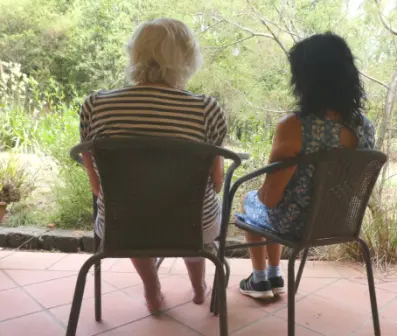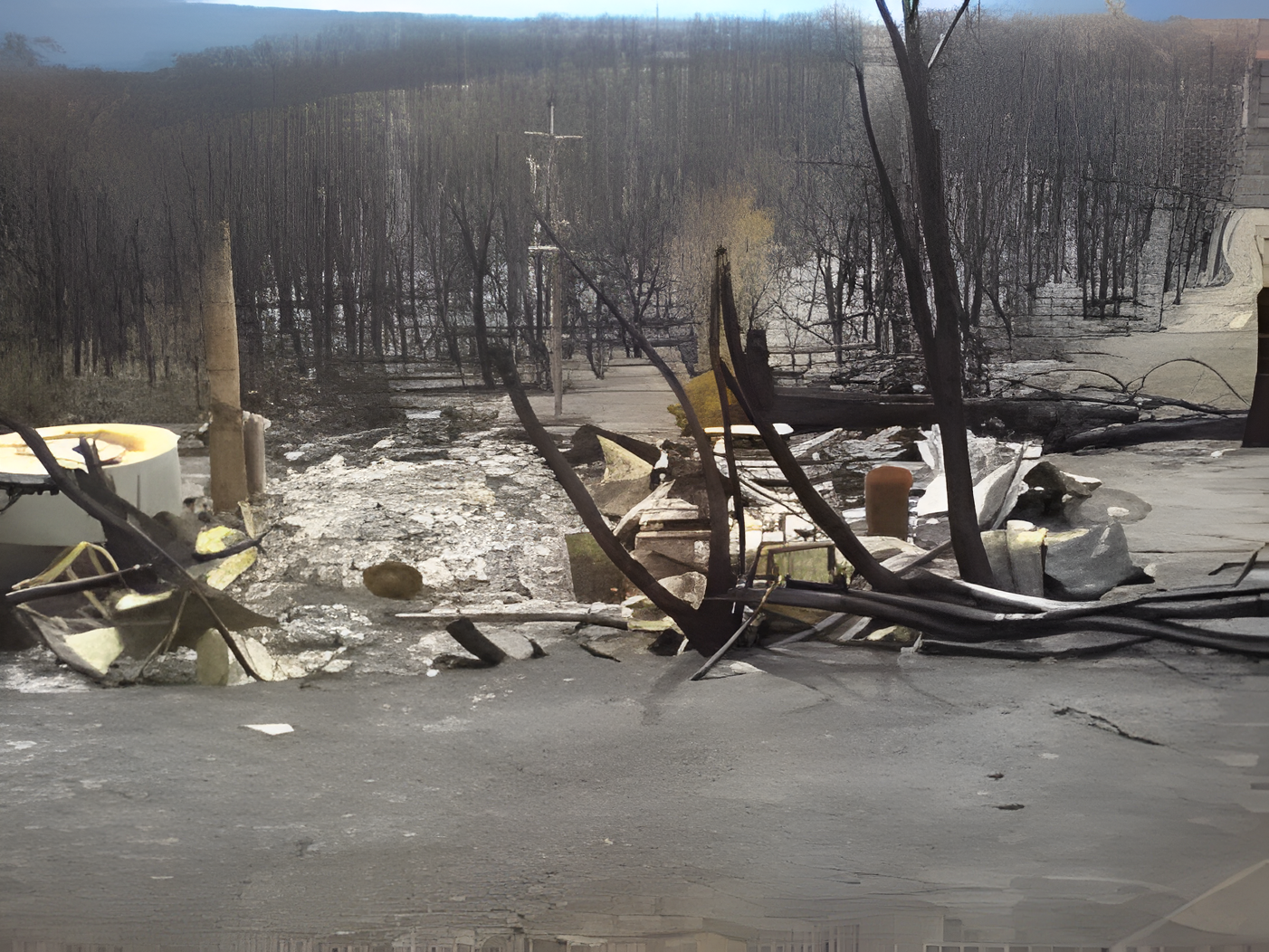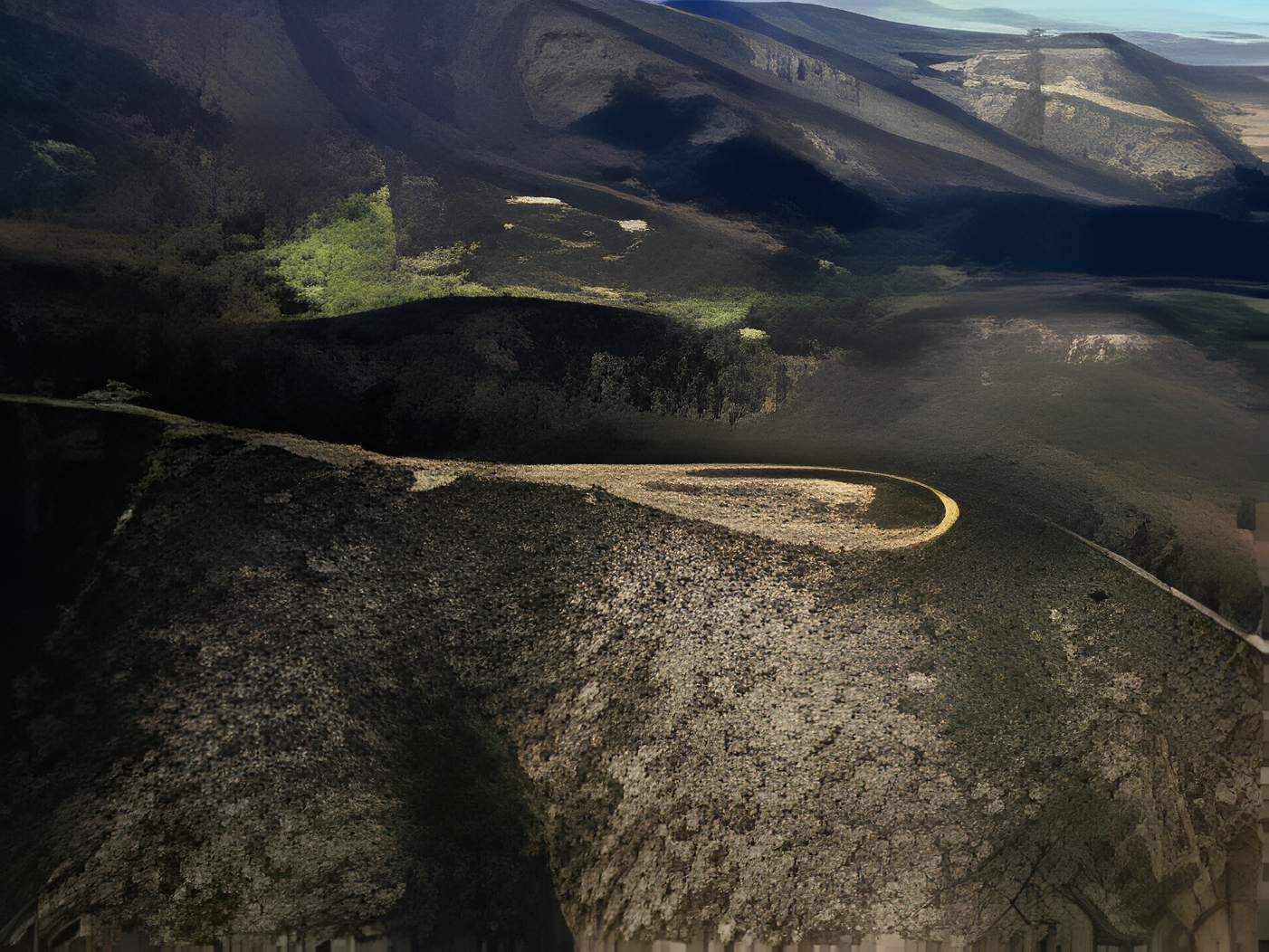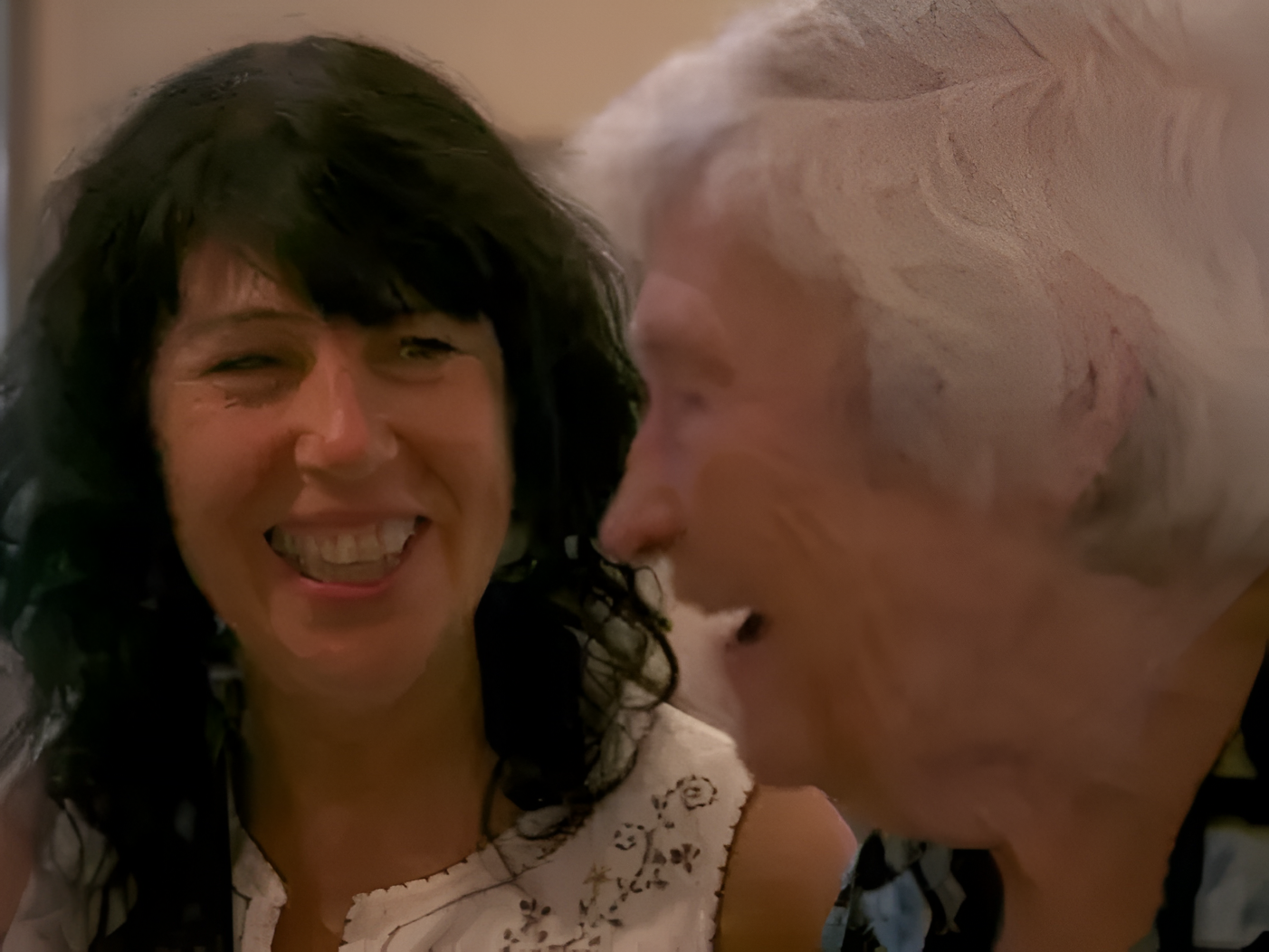Sitting Beside Bushfire Survivors
A personal account of the aftermath of the Black Saturday bushfires, written by Liezl Shnookal

I was one of the lucky ones. Some of us who lived in St Andrews on 7 February 2009 escaped the Black Saturday inferno simply because the wind changed and took the bushfire to others instead. I didn’t lose my house or possessions; I lost no family members. There are many stories of those who did – stories of devastating loss, heroism, death and miraculous escape. My story is a parallel story – although a much smaller one – and I write it with distress, humility and grief. I also write it with love. I mean no disrespect to those who lost so much, and I make no claim to universal truth. This is just my own personal story.
I knew right from the start that any bushfire on that day would be catastrophic; it felt like Armageddon had arrived. But punch-drunk from days of exhausting heat, I didn’t pay sufficient attention to the public warnings and woke from a late afternoon nap to a vivid, burnt-orange sky. Ash was floating strangely in the air like snowflakes alongside great tumbling strips of bark. This could only mean one thing. From my neighbours’ cleared hilltop, I saw the massive firestorm roaring towards us before it headed away, detonating houses, cars and gas bottles on impact. Later, the anguish on the faces of CFA firefighters confirmed the extent of the devastation. ‘There’s hardly anything left,’ one burly firefighter murmured, ‘from Mittons Bridge... up.’ He covered his face with his hands as if to block out what he had just seen. It was obvious that the death toll was going to be high.
Indeed, it was a miracle that so many people managed to survive. The night of Black Saturday, I looked into the dazed eyes of my friend Ange, who had somehow walked her family out of their burning house and through the flames to safety. Another friend, Colin, had a similarly blank expression on his face when he emerged the next day from his razed area with his wife and little boy, alive against all odds. Both smelt strongly of smoke and had been within minutes of death. I hugged these friends gratefully, knowing how close I had come to losing them.
In the days and weeks that followed, I watched the familiar faces of beloved friends change as their initial shock and disbelief were replaced by overwhelming grief and distress. They shared with me a myriad of stories about what had happened, of couples whispering final farewells to each other as they huddled under blankets inside burning houses... A little dog consumed by flames in front of its family... a son’s call echoing throughout Black Saturday’s long night but receiving no answer from his father on the neighbouring property... A host of images became indelibly imprinted on my mind. With no traumatic experience of my own to engulf me, I listened and absorbed the distressing stories of those around me.
‘Sometimes,’ my old pal Helen told me a month after Black Saturday, ‘I get so homesick.’ She looked despondently around her temporary accommodation, a unit in Montmorency. I nodded, knowing how much she loved her St Andrews home of several decades – her house, her pet sheep, her chooks and the bush, all of which had been taken from her. Helen recounted how one of her cherished sheep had had to suffer four days of agony from extreme burns before she had finally been allowed to return to her property and put her pet down. The memory clearly tortured my friend, and I steered our conversation towards happier times, of Landcare meetings around her kitchen table and raucous parties on her verandah. But eventually, Helen came back to the present and said quietly, ‘You know, Liezl, I just want to go home.’ I gave her my love and support but kept my sorrow in check – she already had enough of her own. Eventually, she brightened up and began talking about plans for her new house. Helen was determined to return home.
Later on, in the privacy of my car, I cried for my friend and for all she had lost. It seemed so tragic that an eighty-two-year-old had to start all over again, and somehow, Helen’s great, resilient spirit just served to make me feel even sadder. It was so incredibly unfair.
Jenni’s home was also incinerated on Black Saturday. Jenni was renowned amongst friends for her passion for collecting antiques. She used to drive long distances on her mission for the perfect piece and would then minutely detail her journey, the item and often several unrelated anecdotes in between to anyone who had the time and patience to listen. Jenni loved to talk almost as much as she treasured her belongings. Yet the fire had reduced her sumptuous velvet lounge suite, her highly prized dining setting and indeed her entire collection of precious possessions to a pile of fine ash. At first, I gazed incredulously at what her hoard of stuff had become, not really comprehending where it had all gone. The rubble and ash that remained did not seem to equate to a whole house, and all the treasures I knew had been inside.

Photo by Colin Buckler
The appalling irony didn’t hit me until later. Although Jenni had left early in the day to escape the heat, she had returned home to retrieve some recent acquisitions after learning of the bushfire. These pots were subsequently found intact in her burnt-out car. However, Jenni herself was reduced to a skeletal torso in the driver’s seat, the intensity of the fire so great that it cremated her arms, her legs and even her head. There was neither dignity nor privacy in death, with evidence to the Bushfire Royal Commission indicating last-minute panic – her car reversed into a gate and surrounded by the remains of burnt kangaroos – and attempts to phone for emergency assistance.
I still find it distressing to think of Jenni’s last moments and wish that I hadn’t heard those details of her death. But there are so many details about Black Saturday that I wish I didn’t know, for once known, they can never be erased. A multitude of horrific stories accumulated for all of us about how our friends died or almost died. Even after years have passed, they continue to haunt and torment.
After Black Saturday, the lucky ones – the survivors – struggled to reconstruct their lives. Some relationships fell apart under strain; other friends exhausted themselves rebuilding; home businesses were difficult to re-establish; jobs couldn’t be resumed; people’s health deteriorated. House sites were cleared quickly after the devastation, but the bushfire left terrible scars on the lives of survivors that would not heal. I looked on, distressed by my friends’ trauma, and tried to do what I could to help. I cleaned a few bricks, picked up some pieces of broken china, did a bit of revegetation work, organised some events, listened... but all the while, I was aware of the inadequacy of this effort in the overall, overwhelming, scheme of things.
As time went on, Black Saturday stories increasingly abounded, but Jenni’s story was rarely told; she had no immediate family to grieve for her and keep her death and her life centre-stage. There were many other stories that were not made public: some families fiercely protected their loved ones, while others simply slipped away from the area, never to return. And, of course, there were so many stories available for the choosing that the media could be highly selective. Nevertheless, it was curious to see which stories gained the most media attention and whose voices guided public perceptions about what had happened to our community.
After the bushfire, our St Andrews community set about rebuilding itself. New labels were applied, which became a matter of significance and, ultimately, of difference. We found ourselves classified as either ‘directly affected’ or ‘not directly affected’ by the event that came to be called ‘Black Saturday’. St Andrews North became a separate entity to separate the burnt areas from the unburnt. The boundary between Strathewen and St Andrews became elastic, with some deaths listed in Strathewen’s death toll while immediate neighbours were included in St Andrews’. New friendships were forged strongly from profound shared experiences. There was great inclusion, but many, too, were excluded and marginalised. Some who had never had a role in the community suddenly came to the fore as our leaders, representatives and spokespersons; others had their voices effectively silenced. There was money, which provided vital support and provoked intense dispute about how it should be spent. Our town received substantial funding, and the decision was made to build a new community centre, although no infrastructure had been lost.
I watched it all from the sidelines, grieving for those who were trying to heal but resenting the new divisions and hierarchies that had arisen. For decades, I had enjoyed the strange melting pot that was the St Andrews community, respecting its history and revelling in its outlandish uniqueness. So I was astonished to read an article by a newcomer claiming that a sense of community had been born after Black Saturday! I felt that his assertion belied the long-established St Andrews community, but I kept silent, as did many others, for it didn’t seem right to contradict the perspective of anyone who had been severely traumatised by Black Saturday.
Besides, my own community had been changed irrevocably with the deaths of Jenni, Reg and Angela, Rob, Garry and Jacinta and little Erryn. I still mourn their loss and remember each one with love. These people, together with others I was not fortunate to know as closely, have left an enormous hole in the local community that can never be filled. The way they died was truly horrific, but each one has left their own special legacy, and it is this that I want to remember. I hold fast to my memories... I smile when I see Rob in his sons, I still air-wrestle Reg over politics, and I inwardly carry Jenni’s flag into planning disputes. I am deeply appreciative of having known them and still miss them.

The photo appeared in the Herald Sun in August 2009. Photographer unknown.
For me, there is something strangely grotesque about this photo, taken a few months after Black Saturday. I can barely recognise the landscape; to me, it looks like scorched skin covered in bristles. For decades, I have loved living amongst the bush and alongside wildlife, treasuring the beauty and serenity of a vibrant natural environment. A strong believer in responsible guardianship of the land, I have laboured long and hard with others on local environmental projects over many years. On Black Saturday, people heard the thundering of animals desperately trying to flee from the inferno. Many of them perished, and those who did manage to survive the flames often died later from starvation and exposure in their razed habitat. There was an eerie silence in the burnt areas and their fringes for a long while afterwards, which I will never forget. The decimation of our glorious natural environment seemed so complete that it was exceedingly difficult not to feel overwhelmed with despair.
But years on, amazingly, much of the land has healed, and there has been enormous regeneration. Miraculously, too, some of the wildlife has flourished again. However, the black sticks along the ridgelines that I can see from my verandah continue to serve as a brutal reminder of the environmental destruction that resulted from Black Saturday’s bushfire.
I, for one, learnt some hard lessons from that terrible day, vital lessons if one is to live in an area of high bushfire risk. As each new fire season approaches, I think of my friend Jenni as I load some of my special ornaments, books and papers into plastic tubs and cart them to the city for safekeeping over the summer. I have always removed items from my home, but now I do so with the full knowledge that it is easy to panic and make a last-minute error of judgement that can cost you your life. I don’t want to lose my precious possessions; neither do I want to die for them.
Before Black Saturday, I thought I had understood the risk of fire. I hadn’t. I knew that my house could burn down – my wooden house is on stumps, located on top of a north-facing slope in the midst of bushland – and so I have always been acutely aware of the risk of losing my home. And I always believed that it was not a safe place to be if a fire threatened. But I had never realised that I could die. The bald statistics of 173 people did not make the difference; rather, it was the people I knew who died that made this a reality. It could have been me but for the wind change.
Every hot, gusty day of that terrible summer, I was terrified. Hearing the sound of my wind chimes would send me into a paroxysm of panic. I sniffed the air constantly for the smell of smoke, like an animal on guard against a predator. In my imagination, I could see my trees instantly igniting as the fire roared towards me; I fled repeatedly. I had lost all sense of safety in my own home, and evacuating during the bad days was not making me feel any less vulnerable; in fact, evacuation served to heighten my sense of alarm.
Friends from outside the area wanted to label my condition ‘survivor guilt’. However, I didn’t feel guilty, and besides, I wasn’t a ‘survivor’, as there had been no immediate threat to my life or house. Black Saturday hadn’t happened to me; it had happened to my friends and to my community. But I had absorbed the terror, grief and distress of others like a sponge, hoping against reason that this would lessen their pain – which, of course, it didn’t.
It wasn’t long before I realised that I had to find a way to be able to live here without fear, or I had to move. After several months of feverish research, I found my solution and built an underground fire shelter during the winter of 2009; its very presence immediately served to reassure me, and it continues to give me great peace of mind during summer.
The bushfire on the day that came to be called Black Saturday felt surreal, as if Armageddon had come. For some of us, it had; for most of us, our lives would never again be the same. It changed us all, whether we were directly or indirectly affected by that bushfire. I pay tribute to the extraordinary tenacity of spirit that kept many of my friends alive, and I am enormously grateful to still have them in my life. I continue to enjoy living in St Andrews with people I care about, our shared wildlife and bush, and the sense of belonging to a community. For here in St Andrews, a home is so much more than a house.

photo by Chris Butler
© Liezl Shnookal 2015